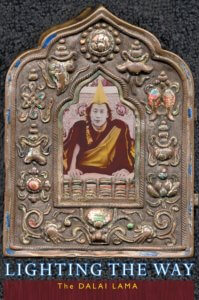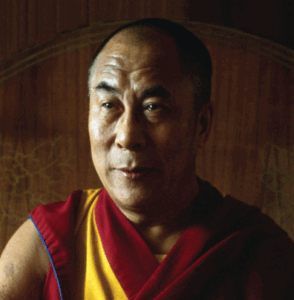This short excerpt is taken from
An Introduction to Buddhism
previously published under the title Lighting the Way
This short excerpt is taken from
previously published under the title Lighting the Way

$16.95 - Paperback
The following excerpt can be found in Lighting the Way on pages 69-71, and in An Introduction to Buddhism pages 61-62.
In the present text Atisha explains these various aspects of the path within the frame work of practices suited to practitioners of the three capacities—the small-, middling- and supreme-capacity practitioners. He is not necessarily referring to three independent categories of individuals, some with a higher capacity, some with a middling or average capacity, and others with a small or limited capacity. What this division principally refers to is the different levels of mental capacity that a single individual may progress through on the various stages of his or her spiritual development.
Initially, therefore, individual practitioners can he said to have a small capacity. Through practice they progress to the next stage and become someone of middling capacity, and with further practice they reach the supreme capacity. We can see an analogy here with the modern educational system. Roughly speaking, these three capacities correspond to elementary school, high school and university levels, as students move through progressively higher and more specialized levels of study.
We can relate Atisha’s teaching on the three capacities to Aryadeva’s three phases of spiritual development as described in the following verse of his Four Hundred Verses on the Middle Way:
First the unwholesome acts are averted;
In the middle the self is averted;
In the final all views are relinquished—
He who knows this is wise indeed.
Aryadeva uses the term ‘unwholesome acts’ to refer to our negative actions and thoughts, which are the main causes of our suffering. When we speak about the causes of suffering we are talking about karma or action, and a distinction is generally made between three types of karma. One is negative or unwholesome karma, another is wholesome or meritorious karma, and the third is immutable or unchangeable karma. The first, negative karma, gives rise to suffering in the lower realms; the second, wholesome karma, gives rise to birth in the higher realms as a human or celestial being; and the third, immutable or unchangeable karma, gives rise to birth in the form and formless realms.
Aryadeva’s first stage, where the practitioner is advised to avert or eliminate unwholesome actions, corresponds to Atisha’s initial scope or small-capacity stage. The principal objective here is to gain freedom from immediate experiences of suffering, and the individual practitioner’s immediate spiritual quest is motivated by the fear of encountering the sufferings of the lower realms. The main spiritual practices at this stage are those of morality—refraining from the ten negative actions of body, speech and mind and going for refuge to the Three Jewels.
The second stage in Aryadeva’s three phases, where our conception of ‘self’ is to be dismantled, corresponds to Atisha’s middling capacity. Here practitioners’ primary motivation is to gain freedom from cyclic existence, and the main practice is the elimination of the mental afflictions that give rise to our suffering and unenlightened existence.
The third and the final stage in Aryadeva’s three phases, where we relinquish all views, corresponds to Atisha’s supreme capacity. Here the principal motivation is not only to gain freedom from cyclic existence but, more importantly, to also attain full enlightenment for the benefit of all beings.
One of the main points underlined by these two frameworks is that even practitioners of middling and supreme capacities must first undertake the practices associated with the small or initial capacity. Each level of practice builds upon the former and relies upon the firm foundation of the proper sequence.
Kindness, Clarity, and Insight
$16.95 - Paperback
$12.95 - Paperback
$17.95 - Paperback
The Great Treatise on the Stages of the Path to Enlightenment (Volume 1)
$34.95 - Paperback
The Great Treatise on the Stages of the Path to Enlightenment (Volume 2)
$28.95 - Paperback
The Great Treatise on the Stages of the Path to Enlightenment (Volume 3)
$34.95 - Paperback

Related Reader Guides
Discover more about HHDL with our Reader's Guide for: His Holiness the Fourteenth Dalai Lama